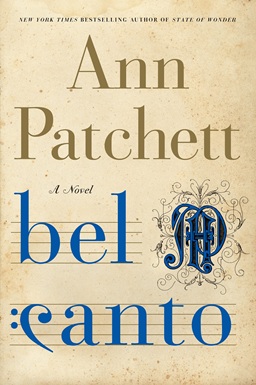Dear Commons Community,
My wife, Elaine, has me on a reading fiction kick. Having recently finished The Neopolitan Novels by Elena Ferrante, she suggested I try Bel Canto by the best-selling author Ann Patchett. Bel Canto is a thriller that takes place in South America (the country is not named). The plot involves the imprisonment of a group of movers and shakers celebrating a Japanese magnate’s birthday on an estate. There is the magnate, a world-class opera soprano, the vice president of the country, and a host of others being held captive. Their captivity goes on for months and a major aspect of the plot is the relationships that evolve among the captives, the revolutionary leaders, and the young insurgents who guard the prisoners. Patchett kept the story interesting as I tried to anticipate what would happen next. I will not give away the ending.
All in all I found it a good read!
Tony
————————————————————————————–
Bel Canto was published in 2002. This review was Posted in Contemporary Literature and Fiction in 2020.
Book Review: Bel Canto by Ann Patchett
A dinner party in the capital city of a South American country takes an unfortunate turn when guerrillas storm the Vice President’s mansion and take everyone hostage. Bel Canto explores what happens when these captors and captives spend months together in close quarters.
I’ve never read any of Ann Patchett’s novels and I heard Bel Canto was one of her best, so I started here. It was published in 2001. I’ve been reading some older books lately, with great results, but I promise I’ll review some recent releases very soon. I have my eye on a couple of thrillers that look really good!
The dinner party that kicks off Bel Canto is held for a Japanese businessman named Mr. Hosokawa. The unnamed South American country was trying to woo him into building a manufacturing plant there. But the only reason Mr. Hosokawa came to the party was to hear famed opera star, Roxane Coss, sing. The guerrillas, consisting of three aging generals and seventeen mostly underage “soldiers”, expected the President to be there. They just wanted to snatch him and run. But the President wasn’t there and instead it turned into a hostage situation with a couple of hundred captives.
The guerrillas were in over their heads. They were an idealistic and nonviolent lot, and incapable of managing a hostage situation. So they and the hostages settle in for the long haul, never making any progress in negotiations with the government. The generals can’t figure out how to extricate themselves from the situation.
Roxane, the opera singer, begins to sing daily, and holds everyone in her thrall. Friendships form and there are a couple of romances. Some of the hostages begin to feel satisfied with their new lifestyle. A malaise creeps in that causes hostages not to try to escape. For their part, some of the young guerrillas like living in the luxurious mansion – it’s a big improvement over how they usually live. No one is in a hurry to leave, but all things must come to an end, especially hostage situations.
Opera is a major theme of Bel Canto (Bel Canto is an opera term). In fact, Ann Patchett said she set out to create an operatic story, complete with grandeur and drama. She also wove in some absurdist comedy, which I thought was done really well. Like with many operas, there were some implausible elements – a young guerrilla that could sing opera, a hostage who happened to be a talented pianist – but I thought it all worked and made for a really good story.
However, the author fell a bit short with creating the inevitable, tragic, operatic ending for Bel Canto. It was covered quickly and wasn’t the gut wrenching scene that it probably could/should have been. The part of me that doesn’t like to cry was grateful for that, but the rational part of me feels like this was a missed opportunity. And the very final scene didn’t make any sense to me. Maybe the author was having a hard time ending it?
Overall, I liked Bel Canto. The writing is good and it is an interesting concept. The characters are very human and likable and I liked the natures of most of the relationships that developed. I was hoping Ann Patchett would figure out a way to give the story a happy ending, but it ended the only way it could.




Tony, your reflection on Bel Canto is a wonderful tribute to how this novel weaves tension, humanity, and unexpected bonds into a gripping read. The way you describe the evolving relationships between captives and captors—set against the backdrop of opera, politics, and survival—really captures the heart of why Patchett’s story stays with you.
Thank you, Paul for taking the time to comment on my posting.
Tony